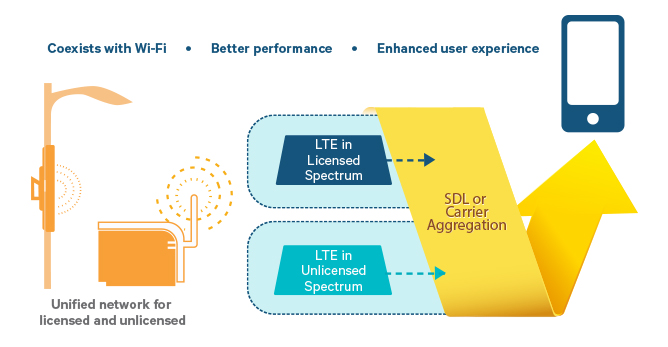Qualcomm's LTE-U Technology Will Boost LTE Connectivity By Using Unlicensed 5 GHz Band
Qualcomm announced its LTE-U chips, which use the unlicensed 5 GHz spectrum currently in use by Wi-Fi networks. LTE-U could become a threat to Wi-Fi networks if it ends up increasing the congestion in the available Wi-Fi spectrum, but Qualcomm said that the technology will actually work in harmony with the Wi-Fi signals.
Today, some carriers boost their cell towers with Wi-Fi, but Wi-Fi is not the same technology as LTE, so the transition between the two is not quite seamless. LTE-U is meant to solve this issue because it's simply LTE that works over another band, that is unlicensed rather than licensed, so everyone can use it, including carriers. Carriers could install many small LTE-U cells everywhere that would end up boosting the signal of their big towers that work on the licensed spectrum.
Another advantage for smartphone users is that they don't have to login to different Wi-Fi networks to benefit from a stronger signal. On the other hand, using data on LTE-U will likely count against your data bill. So far, only Verizon and T-Mobile have signed up for LTE-U deployments, but AT&T and Sprint will probably follow them soon, too.
The main motivation to use LTE-U for both Qualcomm and carriers is to address the explosion of mobile data demand over the next decade. The company said that forecasts put mobile data consumption at 1000x what it is today within 10 years, so new solutions and technologies will need to account for that growth.
“As the Internet enters a new phase of growth, in which more devices are connected and share richer data, there is a need to cost effectively address the challenges of a 1000x increase in mobile data traffic. To do this, we need a combination of more spectrum, more efficient use of existing spectrum, and more small cells," said Matt Grob, executive vice president, Qualcomm Technologies, Inc., and chief technology officer. “Our job is to help the industry make the best use of all available spectrum, using both LTE and Wi-Fi technologies, to increase capacity."
The first chipset family to integrate the LTE-U technology will be the FSM99xx, and it should be available in the second half of this year to mobile device makers. Consumers will be able to use LTE-U technology in their smartphones in the first half of 2016. Qualcomm also announced the FTR8950, which is the first RF solution for the small LTE-U cells that the carriers will be deploying. The company will offer more details at MWC next week.
Follow us @tomshardware, on Facebook and on Google+.
Get Tom's Hardware's best news and in-depth reviews, straight to your inbox.
Lucian Armasu is a Contributing Writer for Tom's Hardware US. He covers software news and the issues surrounding privacy and security.
-
jasonelmore they shouldn't be allowed to do it. Tons of consumer electronics already uses the 5ghz band and this will hog the channels.Reply
A lot of routers and phones use multiple channels on the 5ghz band for bandwidth increase. -
coolitic If it works on a 5 GHZ channel that is not associated with wifi, then there is nothing to worry about.Reply
Remember, 5 GHZ ranges across multiple channels. -
somebodyspecial If it counts against your data plan, I don't understand why anyone would use it. I already can't watch a full 720p movie at 2GB (most people fall here), so they're missing the point of wifi. When you pull into starbucks, McD's etc, it is to browse, watch etc for FREE on their network. I'm sure they can come up with a way to block it when I'm at home, but if it's complicated at all most users would end up on lte-u and get a whopping bill or something, have their data wasted etc. They better be able to figure out how to always get to wifi first that won't charge your data or this will just piss off a lot of NON-techies that keep getting themselves screwed.Reply
Even simply being lazy could end up screwing techies. IE, 80% of silk road users NEVER used PGP or any encryption on messages etc even though it merely takes 10-15mins to master it. Most of the people on there were doing illegal things ;) That still wasn't enough to make people paranoid and use encryption. I'm guessing if you could find that place (or others like it), use bitcoins etc, you could probably figure out PGP. But only 20% used it...LOL. This better be really simple or Qcom could end up getting a bed reputation with many users who would simply avoid buying anything that says it has qcom anything in it. It might only be LTE-U you'd be trying to avoid, but many would just see Qcom and say "no way" if the reputation takes a hit here. -
scotch84 LTE-U may operate in a "unlicensed environment " but I agree above that most will no comprehend the fine print data usage cost consequence . Mobile network carriers will jump all over this & promote it to their benefit not the customer . So this is a taste of whats to come at a price for IoT ...oh yeah and that Net Neutrality thingy too. Makes you kinda wonder at QCOM timing of this announcement and who there actual marketing target is !?Reply
